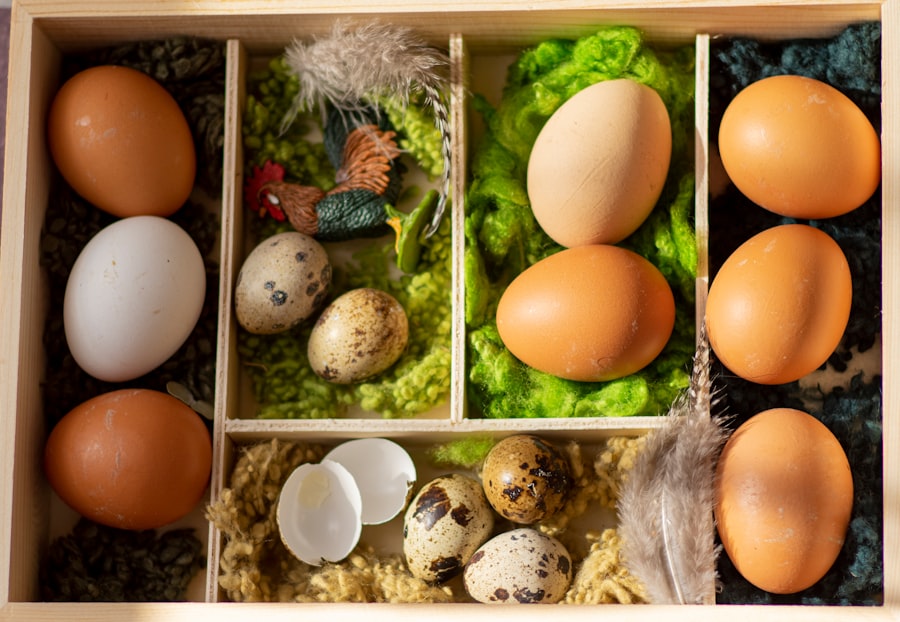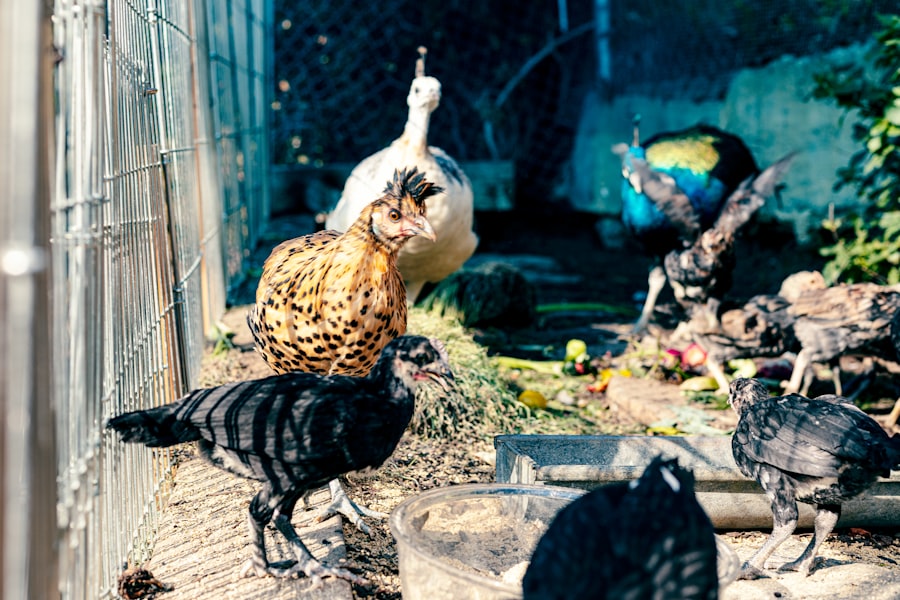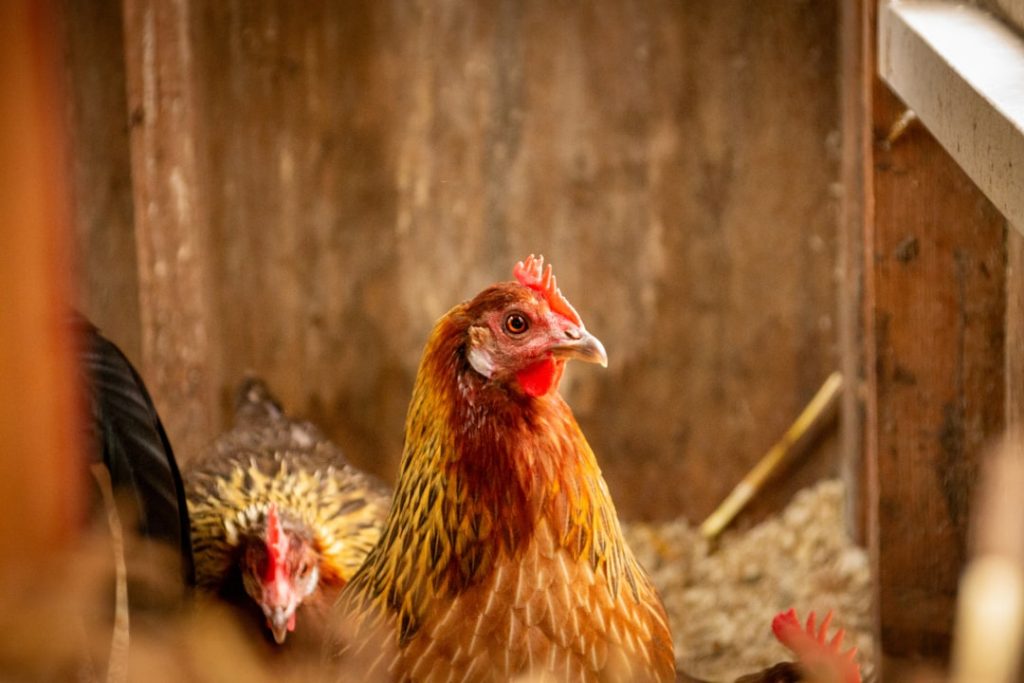Providing a safe and comfortable coop is crucial for raising chickens. The coop must be secure against predators like foxes, raccoons, and birds of prey, with sturdy walls and a reliable roof. Proper ventilation is essential to prevent ammonia buildup from droppings, which can harm the chickens’ respiratory health.
Insulation is necessary to maintain appropriate temperatures year-round. Comfortable bedding is another key element of chicken care. Materials such as straw, wood shavings, or sand offer a soft, absorbent surface for the birds.
Regular cleaning and replacement of bedding prevent bacterial and parasitic growth. The coop should include perches for roosting and nesting boxes for egg-laying. These boxes should be lined with clean straw or shavings to create an inviting environment for hens to lay eggs.
Table of Contents
Key Takeaways
- Provide proper ventilation and insulation to maintain a comfortable temperature in the coop
- Use non-toxic materials and secure fencing to ensure the safety of the chickens
- Offer a balanced diet including grains, greens, and protein to promote overall health
- Rotate grazing areas and provide perches and toys for mental and physical stimulation
- Regularly clean the coop, provide fresh bedding, and monitor for signs of illness or stress
- Spend time with your chickens, handle them gently, and provide positive reinforcement for good behavior
Providing Nutritious and Varied Diet
Commercial Feed: The Foundation of a Healthy Diet
To keep your chickens healthy and happy, it’s essential to provide them with a nutritious and varied diet. This starts with offering a high-quality commercial feed that is specifically formulated for laying hens. This feed should contain a balance of protein, carbohydrates, vitamins, and minerals to support the birds’ overall health and egg production.
Supplementing with Fresh Fruits, Vegetables, and Kitchen Scraps
In addition to commercial feed, it’s important to supplement the chickens’ diet with fresh fruits and vegetables, as well as kitchen scraps such as bread, pasta, and rice. These treats can provide additional nutrients and variety to the birds’ diet.
Access to Clean Water and Grit
Chickens require a lot of water, especially when they are laying eggs, so it’s crucial to regularly check and refill their waterers. Additionally, it’s important to provide access to grit, which is small stones or sand that the chickens use to grind up their food in their gizzards. This helps them digest their food more effectively and absorb nutrients from their diet.
Monitoring Body Condition and Adjusting the Diet
Finally, it’s essential to monitor the chickens’ body condition and adjust their diet as needed to ensure that they are maintaining a healthy weight and producing high-quality eggs.
Ensuring Adequate Space for Exercise

Chickens are active animals that require plenty of space to exercise and move around. In order to ensure their physical and mental well-being, it’s important to provide them with adequate space to roam and explore. This can be achieved by providing a spacious outdoor run attached to the coop, as well as allowing the chickens to free-range in a safe and secure area.
The outdoor run should be enclosed with wire mesh to prevent predators from entering, and it should be covered with a roof or netting to protect the birds from aerial predators. In addition to outdoor space, it’s important to provide enrichment items such as perches, dust baths, and toys for the chickens to interact with. Perches allow the birds to roost at different heights and provide mental stimulation, while dust baths allow them to engage in natural behaviors such as dusting themselves to keep their feathers clean and free of parasites.
Toys such as hanging treats or mirrors can also provide entertainment and enrichment for the birds. Finally, it’s important to rotate the chickens’ access to different areas of the yard or pasture to prevent overgrazing and allow the land to recover.
Offering Enrichment Activities
Enrichment activities are essential for keeping chickens mentally stimulated and engaged. Chickens are intelligent animals that require mental stimulation in order to prevent boredom and stress. One way to provide enrichment is by offering a variety of perches and roosts for the chickens to explore.
Different heights and textures can provide mental stimulation and encourage natural behaviors such as jumping and roosting. Additionally, providing access to dust baths allows the chickens to engage in natural behaviors such as dusting themselves to keep their feathers clean and free of parasites. Another way to offer enrichment is by providing toys and treats for the chickens to interact with.
Hanging treats such as cabbage or corn on a string can provide entertainment and encourage natural foraging behaviors. Additionally, mirrors or shiny objects can provide visual stimulation for the birds. It’s important to rotate these enrichment items regularly to prevent habituation and keep the birds engaged.
Finally, allowing the chickens access to a variety of outdoor environments such as grassy areas, wooded areas, and open spaces can provide mental stimulation and encourage natural behaviors such as scratching, pecking, and exploring.
Maintaining Clean and Healthy Living Conditions
Maintaining clean and healthy living conditions is essential for keeping chickens healthy and preventing the spread of disease. This means regularly cleaning the coop and outdoor run to remove droppings, old bedding, and debris. It’s important to use a safe disinfectant to clean surfaces and equipment in order to kill bacteria and parasites.
Additionally, it’s important to regularly inspect the coop for signs of wear or damage, such as holes in the walls or roof, which can allow predators or pests to enter. In addition to cleaning the coop, it’s important to regularly clean and refill the chickens’ waterers and feeders. This helps prevent the buildup of bacteria and mold that can make the birds sick.
It’s also important to regularly inspect the chickens for signs of parasites such as lice or mites, which can cause discomfort and stress. If parasites are found, it’s important to treat the birds with an appropriate medication in order to eliminate the infestation.
Monitoring for Signs of Illness or Stress

Recognizing Signs of Illness
Chickens can exhibit various signs of illness, including lethargy, loss of appetite, abnormal droppings, respiratory symptoms, or changes in feather condition. It’s essential to be aware of these signs to take prompt action and prevent the spread of disease.
Identifying Signs of Stress
In addition to signs of illness, chickens can also display signs of stress, such as feather picking, aggression, or excessive vocalization. Regular handling of the birds can help identify any abnormalities, such as lumps or injuries, which may not be immediately apparent through visual observation.
Maintaining Accurate Records and Monitoring Egg Production
Keeping detailed records of observations, changes in behavior, and egg production is crucial to track patterns over time. Monitoring egg production and quality can also indicate underlying health issues, allowing you to take proactive measures to address any problems.
Building a Positive Relationship with Your Chickens
Building a positive relationship with your chickens is essential for their well-being and your enjoyment of keeping them. This means spending time with the birds on a regular basis in order to socialize with them and gain their trust. Chickens are social animals that enjoy interaction with their human caretakers, so it’s important to spend time talking to them, offering treats, and gently handling them.
In addition to socialization, it’s important to handle the birds gently and respectfully in order to build trust and prevent stress. This means approaching them calmly and avoiding sudden movements or loud noises that could startle them. It’s also important to establish a routine for feeding, cleaning, and handling the birds in order to provide consistency and predictability.
Finally, building a positive relationship with your chickens means respecting their natural behaviors and instincts. This includes allowing them opportunities for natural behaviors such as scratching, pecking, dust bathing, and roosting. By providing a safe and enriching environment that supports their natural behaviors, you can build a strong bond with your chickens based on trust and mutual respect.
If you’re looking for ways to keep your pet chickens happy, you may also be interested in learning about the best location for your chicken coop. Check out this article on where to put your chicken coop for tips on finding the perfect spot for your feathered friends to thrive.
FAQs
What are some ways to keep pet chickens happy?
Some ways to keep pet chickens happy include providing them with a spacious and clean coop, giving them access to fresh water and nutritious food, allowing them to roam and forage, and providing them with opportunities for dust bathing and perching.
How much space do pet chickens need to be happy?
Pet chickens need at least 2-3 square feet of space per bird inside the coop, and at least 8-10 square feet of outdoor space per bird for foraging and roaming. Providing more space can contribute to their overall happiness and well-being.
What kind of food do pet chickens need to be happy?
Pet chickens need a balanced diet that includes a high-quality commercial feed, as well as access to fresh fruits, vegetables, and grains. Additionally, providing them with access to insects and other protein sources can contribute to their happiness and health.
Why is it important for pet chickens to have access to fresh water?
Access to fresh water is crucial for pet chickens’ health and happiness. Chickens need water to stay hydrated, regulate their body temperature, and aid in digestion. Clean and easily accessible water sources are essential for their well-being.
What are some signs that indicate a pet chicken is happy?
Some signs that indicate a pet chicken is happy include active foraging and scratching, vocalizing contented clucks, relaxed body language, and engaging in natural behaviors such as dust bathing and sunbathing. Additionally, healthy egg production can be a sign of a happy and contented chicken.
Meet Walter, the feathered-friend fanatic of Florida! Nestled in the sunshine state, Walter struts through life with his feathered companions, clucking his way to happiness. With a coop that’s fancier than a five-star hotel, he’s the Don Juan of the chicken world. When he’s not teaching his hens to do the cha-cha, you’ll find him in a heated debate with his prized rooster, Sir Clucks-a-Lot. Walter’s poultry passion is no yolk; he’s the sunny-side-up guy you never knew you needed in your flock of friends!







